1. Overview
Asafa Powell is a retired Jamaican sprinter renowned for his consistent speed in the 100 metres, twice setting the world record at 9.77 and 9.74 seconds between 2005 and 2008. His career is marked by an unparalleled number of sub-10 second runs in the 100 metres, totaling 97, the most by any athlete. Despite his dominance on the Grand Prix circuit, Powell often faced challenges in major championship finals, leading to him being dubbed the "uncrowned king." He earned an Olympic gold medal in the 4 × 100 metres relay at the 2016 Rio de Janeiro Games, which became his sole Olympic gold after the Jamaican team's 2008 Beijing relay gold was vacated due to a teammate's doping violation. Powell also secured multiple medals at the World Athletics Championships and Commonwealth Games, contributing significantly to Jamaica's rise as a sprinting powerhouse. He officially retired from professional athletics on 23 November 2022.
2. Early life and background
Asafa Powell's early life in Spanish Town, Jamaica, was shaped by a deeply religious family and a strong athletic heritage that eventually steered him towards a career in sprinting.
2.1. Birth and family
Asafa Powell was born on 23 November 1982, in Spanish Town, Jamaica. He is the youngest of six sons born to two Christian ministers. His family had a notable athletic background; his father, Williams Powell, recorded a 100 metres time of 10.2 seconds, and his mother, Sislyn Powell, ran 11.4 seconds. All five of his older brothers were also short-distance runners, each achieving times under 10.5 seconds in the 100-yard dash. His eldest brother, Donovan Powell, was a 60 metres finalist at the 1999 IAAF World Indoor Championships and represented Jamaica in the 400 metres relay at the 2000 Sydney Olympics. Additionally, Derrick Atkins of Bahamas, who won a silver medal in the 100 metres at the 2007 World Championships in Athletics, is Powell's second cousin.
2.2. Education
Powell attended Ewarton Primary School and Charlemont High School, both located in St. Catherine, Jamaica.
2.3. Entry into athletics
Initially, Powell had aspirations of becoming a mechanic or an electrical engineer. However, while studying in Kingston, Jamaica, he transitioned into athletics, a path significantly influenced by his family's running history. In 2002, he began to seriously pursue track and field at a university in Kingston. Unlike many of his peers who moved to the United States for training, Powell chose to remain in Kingston, where he often trained on grass tracks using flat shoes. Since 2001, he has been coached by Stephen Francis at the MVP (Maximising Velocity and Power) Track & Field Club, based at the University of Technology, Jamaica. Francis notably sought out a 100 metres stretch of road with a 10% slope to train Powell's start, aiming to enhance the tall teenager's initial acceleration.
3. Athletic career
Asafa Powell's athletic career spans over two decades, marked by periods of world record-breaking performances, significant championship medals, and persistent challenges with injuries and a notable doping incident.
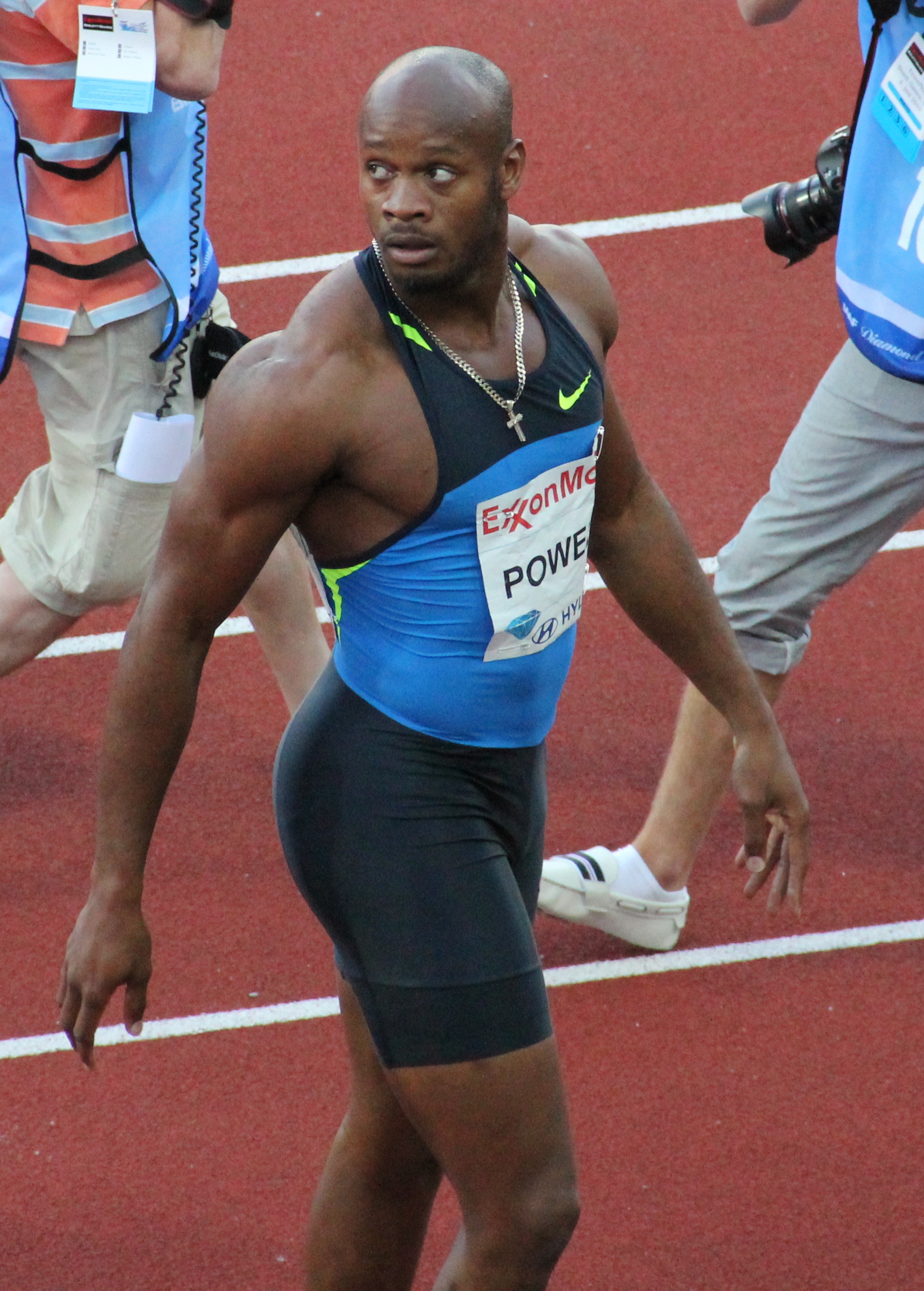
3.1. Early career and emergence (2000-2004)
Powell's sprinting journey began with his participation in school competitions. In 2000, representing Charlemont High at the ISSA High School Championships, he placed fourth in the Class 1 200 metres with a time of 23.07 seconds against a -3.8 mph (-1.7 m/s) headwind. He also finished third in his heat of the Boy's Class 1 100 metres, recording 11.45 seconds with a -5.1 mph (-2.3 m/s) headwind, but neither time was sufficient for him to advance. The following year, in 2001, he competed again at the ISSA High School Boy And Girls Championships, finishing seventh in the Class 1 100 metres Final. Recognizing his potential, coach Stephen Francis began working with Powell a week later. Powell quickly demonstrated his talent by winning the Boys Under-20 100 metres event at the JAAA National Championships on 22 June, clocking 10.50 seconds.
In 2002, Powell competed at the 2002 Commonwealth Games in Manchester, where he set a personal best of 10.26 seconds in the 100 metres semi-finals, finishing fifth. He then joined Michael Frater, Dwight Thomas, and Christopher Williams to form the Jamaican 4 × 100 metres relay team, which secured a silver medal. Powell ran the anchor leg, finishing just behind Darren Campbell, with both athletes recording 38.62 seconds.
Powell gained international attention at the 2003 World Championships in Athletics in Paris. In the 100 metres quarter-final, he was controversially disqualified for a false start, with his reaction time measured at 0.086 seconds. This incident occurred alongside Jon Drummond's memorable protest after suffering the same fate. Six days later, Powell was added to the 4 × 100 metres relay team for the semi-final, running the anchor leg and helping the team qualify for the final with the second fastest time. However, the Jamaican team failed to finish the final due to a botched second baton exchange, preventing Powell from competing for a medal. During the 2003 season, Powell won two IAAF Grand Prix events, including an IAAF Golden League event. He finished seventh in the 100 metres at the IAAF World Athletics Final with a time of 10.23 seconds.
The year 2004 marked a significant breakthrough for Powell. On 12 June, he recorded his first sub-10 second 100 metres race, clocking 9.99 seconds with a 4.0 mph (1.8 m/s) wind, at the National Junior Track and Field Championships in Spanish Town. Two weeks later, he solidified his status as a medal favourite for the 2004 Athens Olympics by winning the Jamaican National Championships with a personal best of 9.91 seconds. Although he ended the season with a record-equaling nine sub-10 second runs, Powell finished a disappointing fifth in the highly competitive Olympic final, with a time of 9.94 seconds. Following this, he withdrew from the 200 metres final, for which he had already qualified. The Jamaican 4 × 100 metres relay team also failed to qualify for the final, finishing fourth in their heat with a season best of 38.71 seconds. After his Olympic disappointment, Powell set a new national record of 9.87 seconds for the 100 metres at the Memorial Van Damme in Brussels on 3 September. He secured five IAAF Grand Prix wins in 2004 and became the first man to win both the 100 metres and 200 metres races at the World Athletics Final, setting championship records in both events. He concluded the season ranked number one in the world for the 100 metres and number four for the 200 metres.
3.2. World record holder and peak performance (2005-2008)
The period from 2005 to 2008 represented the pinnacle of Asafa Powell's career, during which he established himself as the fastest man in the world, setting and re-setting the 100 metres world record.
In 2005, Powell continued his strong form by setting a new national record of 9.84 seconds at the Jamaica International Invitational in May. On 14 June 2005, in Athens, he broke the 100 metres world record, clocking 9.77 seconds with a 3.6 mph (1.6 m/s) wind. This time surpassed Tim Montgomery's 2002 record of 9.78 seconds by just 0.01 seconds (Montgomery's record was later annulled due to doping charges). Coincidentally, Powell achieved this feat on the same track where Maurice Greene had set his 9.79-second world record in 1999. He again won the 100 metres final at the Jamaican National Championships. However, a groin injury in July prematurely ended his season, forcing him to miss the 2005 World Championships in Athletics. Despite the shortened season, Powell recorded the three fastest 100 metres times of the year, received the Caribbean And Central American (CAC) Male Athlete of the Year award, and was ranked second in the world.
The year 2006 proved to be Powell's most successful season. He clinched the 100 metres title at the 2006 Commonwealth Games in Melbourne after a dramatic semi-final that included two disqualifications and three false starts. Although Powell veered into another competitor's lane while checking the scoreboard, he was not deemed to have impeded the runner. He also anchored the 4 × 100 metres relay team, securing two gold medals at the Games. In May, he won the 100 metres at the Jamaica International Invitational in 9.95 seconds. Beyond his Commonwealth Games success, he won the 200 metres at the Jamaican National Championships in June and dominated the IAAF Grand Prix circuit, winning ten 100 metres events, including all six Golden League events.
Powell equalled his world record time of 9.77 seconds on 11 June 2006, at Gateshead International Stadium, with a wind assistance of 3.4 mph (1.5 m/s). The precise time recorded was 9.7629 seconds, which was rounded up to 9.77 seconds according to IAAF rules. He repeated this feat for a second time on 18 August 2006, in Zürich, with a wind assistance of 2.2 mph (1 m/s). His victory in his sixth Golden League event for the 100 metres in the same season earned him a total of 250.00 K USD in prize money. Powell also won the 100 metres at the World Athletics Final, setting another championship record on 9 September. A week later, at the World Cup in Athletics, the Americas team, anchored by Powell, recorded a DNF (Did Not Finish). In October, Powell again received the CAC Male Athlete of the Year award. On 12 November 2006, he was honored with the title of 2006 Male IAAF World Athlete of the Year, accompanied by a cheque for 100.00 K USD. He also received the Track & Field Athlete of the Year award for 2006.
In 2007, Powell continued to receive accolades, including the Commonwealth Games Sports Foundation Athlete of the Year award on 5 January, and an honour at the International Sports Group (ISG) Awards Banquet in New York on 3 February. He was also nominated for the Laureus World Sports Awards Sportsman of the Year award. However, the season was also affected by injuries. He missed weeks of training and competitions, including the Penn Relays and the Jamaica International Invitational in May, due to knee tendinitis. Powell again became the Jamaican National Champion for the 100 metres but injured his groin during the final at the Jamaica Championships. At the 2007 World Championships in Athletics in Osaka, Japan, Powell finished third in the 100 metres final with a time of 9.96 seconds against a -1.1 mph (-0.5 m/s) headwind, behind Tyson Gay and his second cousin Derrick Atkins. Powell later admitted that he "panicked" and "gave up" after seeing Gay pass him. Former American sprinter Michael Johnson criticized Powell's performance, stating that he "just gave up." Despite the individual disappointment, Powell contributed to a silver medal in the 4 × 100 metres relay, anchoring the Jamaican team to a national record of 37.89 seconds.
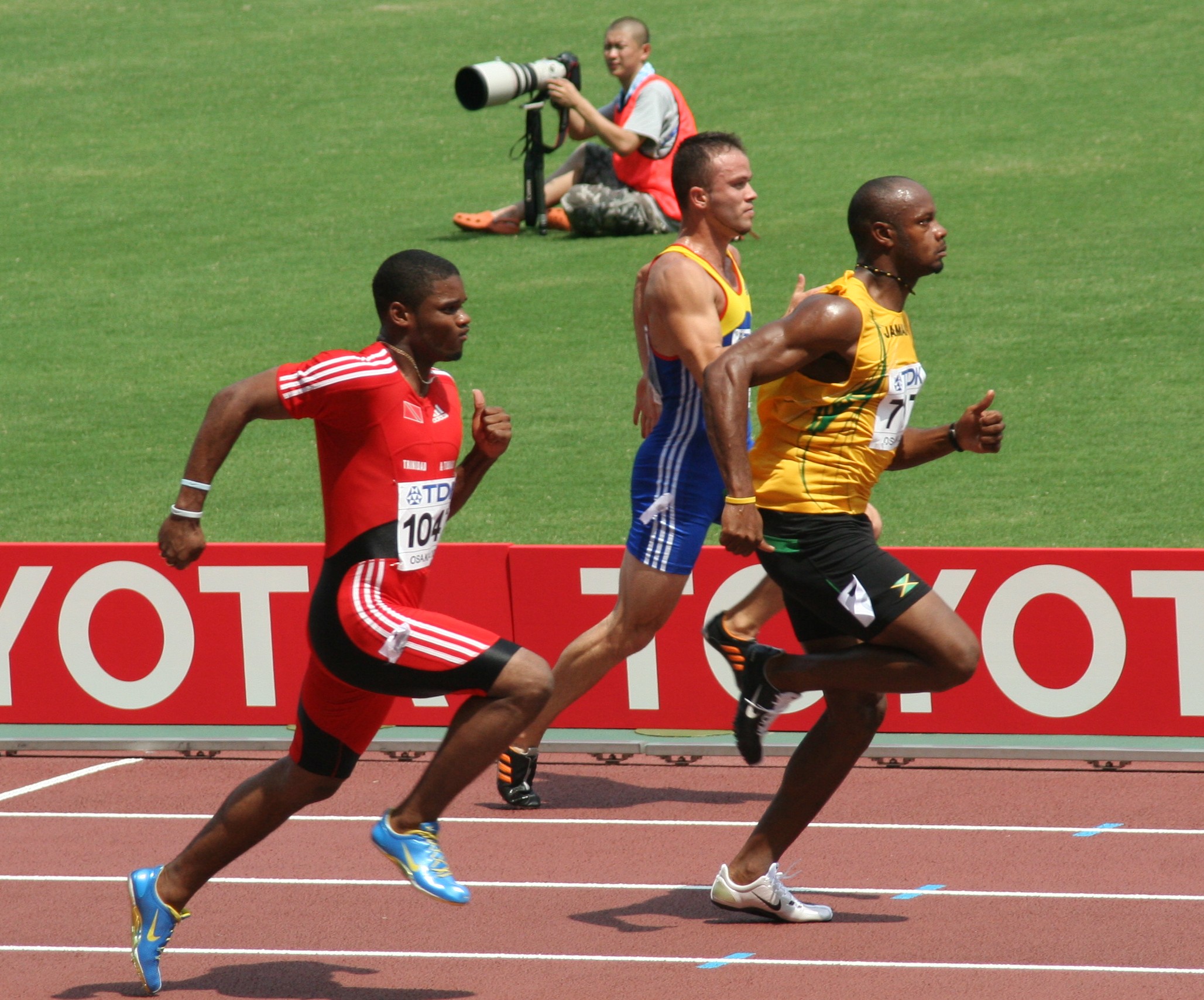
On 9 September 2007, in the opening heats of the IAAF Grand Prix in Rieti, Italy, Powell set a new world record in the 100 metres with a time of 9.74 seconds, aided by a 3.8 mph (1.7 m/s) wind. This fulfilled his promise to break the record after his Osaka bronze medal. Notably, Powell eased up in the final few metres of this record-setting run, indicating he was conserving energy for the final. In the final itself, he ran 9.78 seconds with no wind. Powell's season concluded on 30 September with a left hamstring injury during the 200 metres race at the Super Track & Field meet in Yokohama, Japan. He finished 2007 with five IAAF Grand Prix event wins and his second consecutive World Athletics Final 100 metres win, again setting a championship record. For the third consecutive year, Powell received the CAC Male Athlete of the Year award. He also received the IAAF Performance of the Year award for his 9.74-second world record and was ranked second in the world.
3.3. Major championship performances
Asafa Powell competed extensively in major international athletics competitions, achieving numerous medals and notable results throughout his career.
3.3.1. Olympic Games
Powell participated in four Olympic Games.
- Athens 2004**: He finished fifth in the 100 metres final with a time of 9.94 seconds. He had qualified for the 200 metres final but withdrew. The Jamaican 4 × 100 metres relay team, of which he was a part, failed to qualify for the final.
- Beijing 2008**: In the 100 metres final, Powell again placed fifth, clocking 9.95 seconds. Seven days later, he anchored the Jamaican 4 × 100 metres relay team to a gold medal, setting a new world record of 37.10 seconds. His anchor split time was recorded at 8.70 seconds, the fastest electronically timed anchor run in history. However, this gold medal was later vacated by the International Olympic Committee in 2017 after a retest of teammate Nesta Carter's sample found the presence of the prohibited substance methylhexaneamine.
- London 2012**: Powell competed in the 100 metres final but finished last (eighth) with a time of 11.99 seconds due to a persistent groin injury. He was unable to compete in the 4 × 100 metres relay.
- Rio 2016**: Powell made a triumphant return, competing as part of the Jamaican 4 × 100 metres men's relay team and winning a gold medal on 19 August 2016. This medal became his only Olympic gold medal after the 2008 medal was stripped.
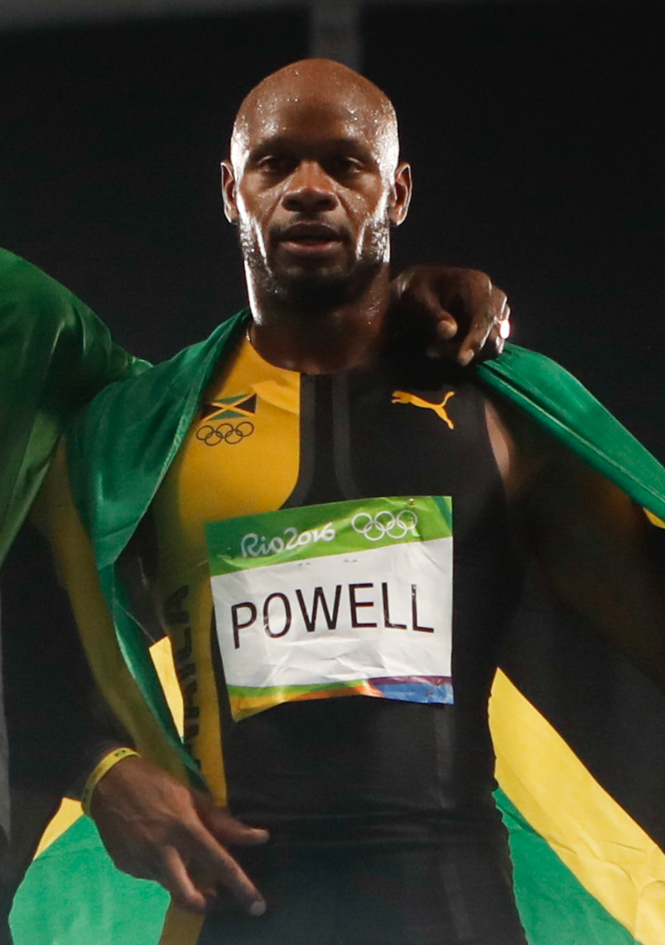
3.3.2. World Athletics Championships
Powell competed in several editions of the World Athletics Championships.
- 2003 Paris**: He was disqualified for a false start in the 100 metres quarter-final. The 4 × 100 metres relay team failed to finish the final.
- 2005 Helsinki**: He missed the championships due to a groin injury.
- 2007 Osaka**: He earned a bronze medal in the 100 metres final with 9.96 seconds. He also secured a silver medal in the 4 × 100 metres relay, helping the Jamaican team set a national record of 37.89 seconds.
- 2009 Berlin**: Powell took a bronze medal in the 100 metres final, running 9.84 seconds. Eight days later, he anchored the Jamaican 4 × 100 metres relay team to a gold medal, setting a new Championship Record of 37.31 seconds. This time was also a world record at the time, which later became the second fastest after the 2008 Beijing Olympic record was vacated.
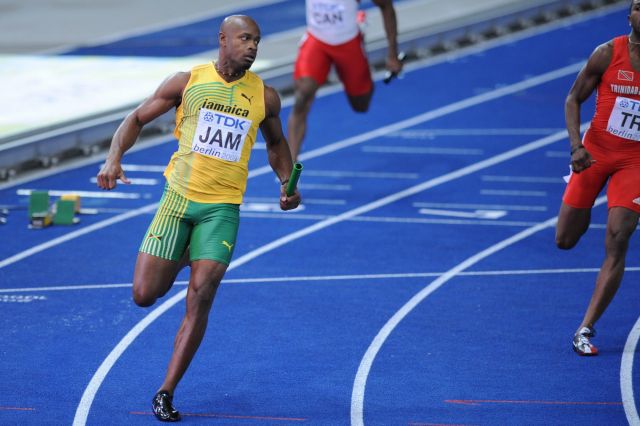
- 2015 Beijing**: He finished seventh in the 100 metres final with a time of 10.00 seconds. He also earned a gold medal as part of the 4 × 100 metres relay team, which finished in 37.36 seconds.
3.3.3. Commonwealth Games and other events
Powell also achieved success in other significant international competitions.
- 2002 Manchester**: He won a silver medal in the 4 × 100 metres relay.
- 2006 Melbourne**: He secured two gold medals, one in the 100 metres (10.03 seconds) and another in the 4 × 100 metres relay (38.36 seconds).
- World Athletics Final**: Powell won the 100 metres five times (2004, 2006, 2007, 2008) and the 200 metres once (2004). He set new championship records in the 100 metres in 2004 (9.98 seconds), 2006 (9.89 seconds), and 2007 (9.83 seconds). He also took silver in the 100 metres in 2009.
- Diamond League**: He was the 100 metres winner in both the 2011 and 2016 seasons.
- Pan American Junior Championships**: He won a silver medal in the 4 × 100 metres relay in 2001 in Santa Fe.
3.4. Injuries and setbacks
Throughout his career, Asafa Powell faced numerous injuries and physical challenges that impacted his performance and participation in key events.
In July 2005, a groin injury forced him to cut his season short and miss the 2005 World Championships in Athletics. The 2007 season saw him suffer from knee tendinitis, which led to him missing the Penn Relays and the Jamaica International Invitational in May. Later that year, he injured his groin again during the final at the Jamaica Championships. His season ended on 30 September with a left hamstring injury sustained during the 200 metres race in Yokohama, Japan.
The year 2008 began with another injury setback as Powell was forced to withdraw from the Sydney Grand Prix meeting due to a gash on his left knee that required four stitches, sustained from tripping on steps at his home. In April, he suffered damage to his pectoral muscles while weight training in Jamaica, which required surgery and sidelined him for two months. On 11 July, he sustained his third injury of 2008-a groin strain or cramp-while leading in a heat at the Golden Gala Roma, causing him to miss the next two Grand Prix events.
In 2009, Powell was involved in controversy when he was a last-minute "no show" at the UTech Track and Field Classic on 18 April, despite being advertised to run. While he attended as a spectator, a press conference failed to fully explain his absence, and the Jamaica Fair Trading Commission launched an investigation. He then withdrew from the 4 × 100 metres relay at the Penn Relays on 25 April due to concerns about his ankle while running the curve. Despite this, he ran the anchor leg, aggravating the ankle injury and finishing ninth. He subsequently withdrew from the IAAF Super Grand Prix in Doha on 8 May to allow his ankle to heal.
3.5. 2010-2011
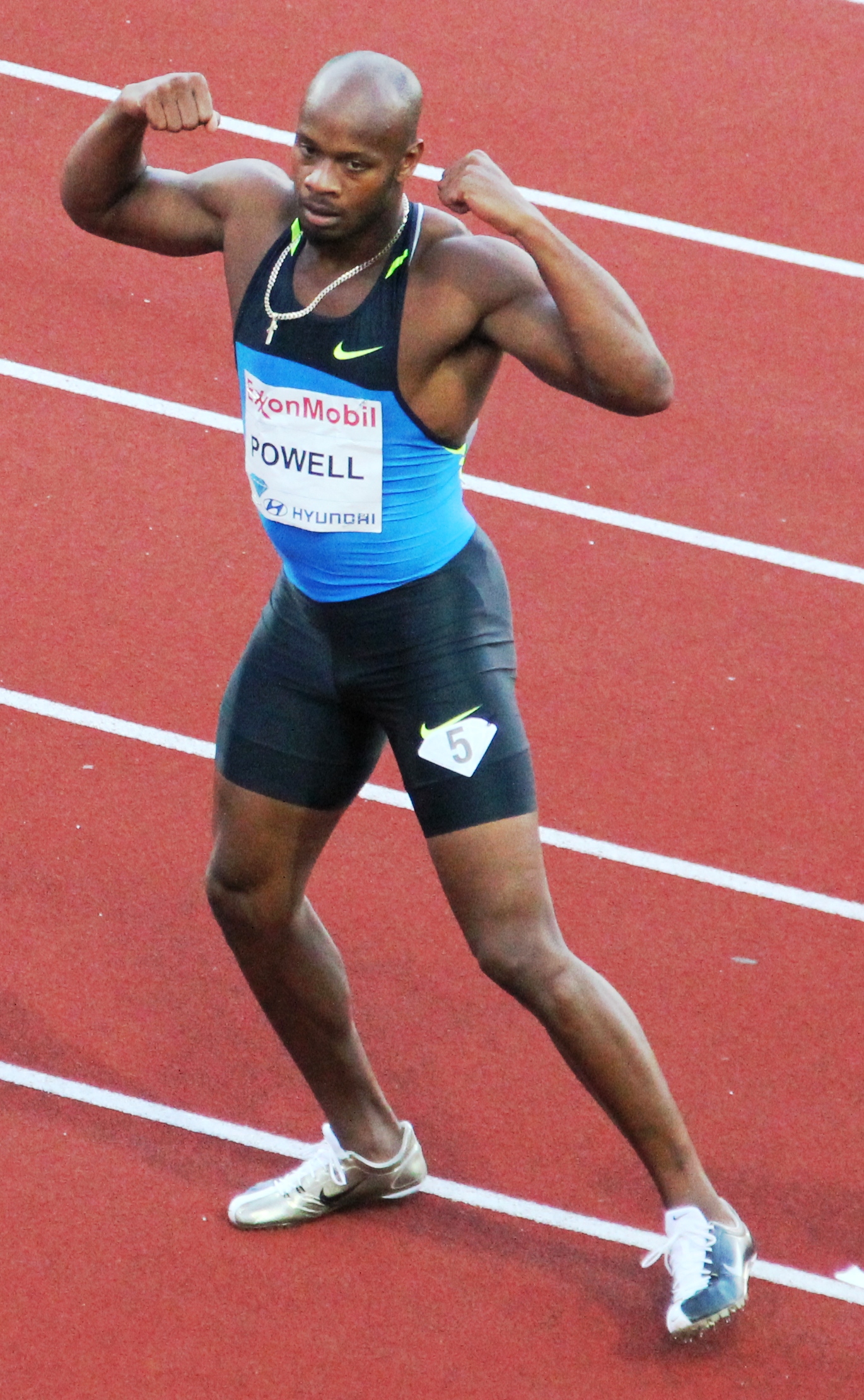
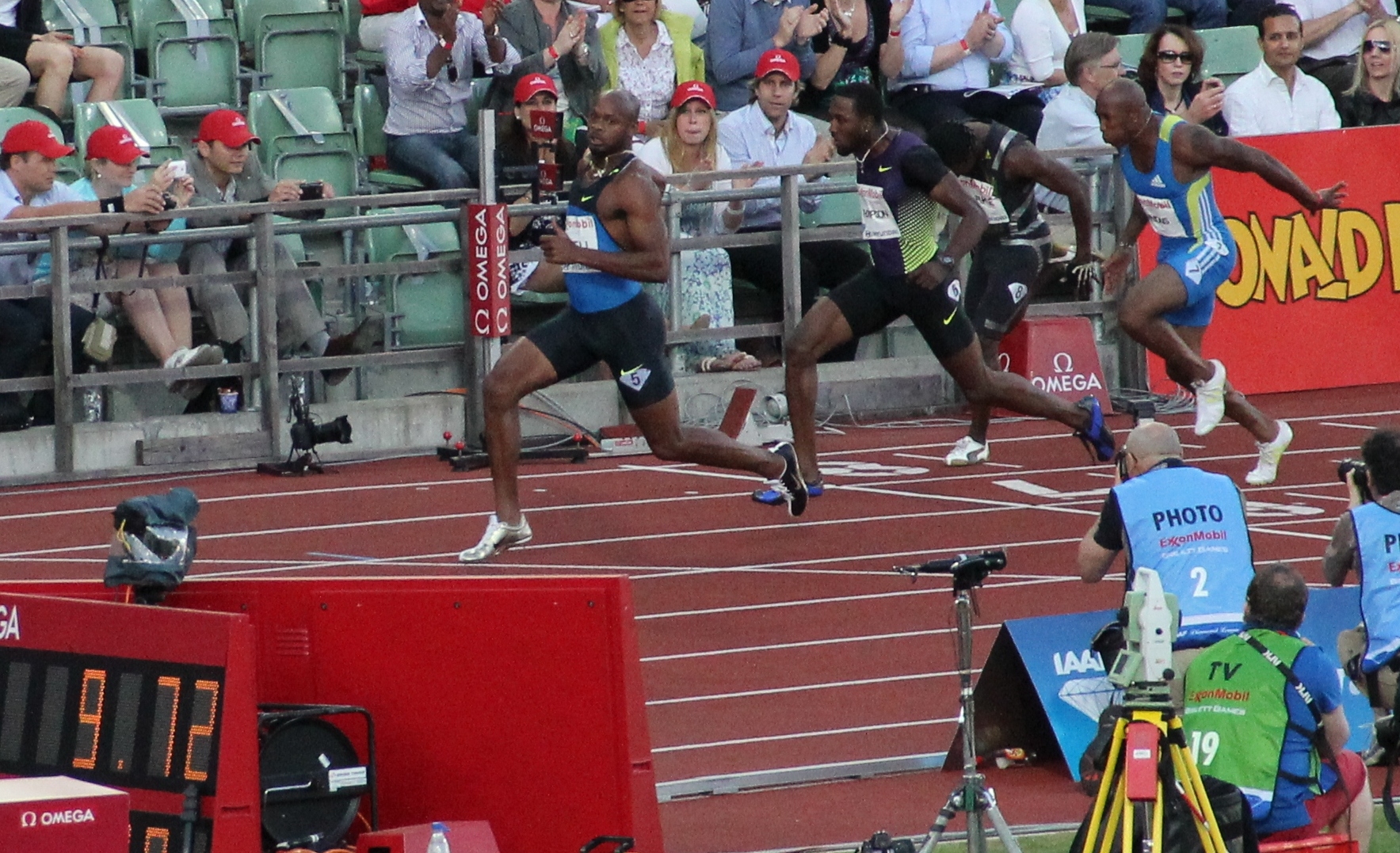
In 2010, Powell experienced minor cramps in his left calf muscles at the UTech Classic and pulled out of the Penn Relays due to an injured toe. Later, hamstring and back problems, aggravated from a meeting in Paris, forced him to miss two anticipated clashes with Usain Bolt and Tyson Gay, ending his season prematurely. The 2011 season also saw him suffer a minor hamstring pain at the Jamaica International Invitational Meet, prompting him to back off as a precaution. In late August, just days before the 2011 World Championships in Athletics in Daegu, South Korea, Powell withdrew from the 100 metres due to a re-aggravated groin strain, and was also unfit to run the 4 × 100 metres relay. His season concluded with another injury, mirroring his 2010 pattern of strong early-season form followed by injuries.
At the 2012 Summer Olympics in London, Powell's persistent groin injury resurfaced during the 100 metres final, causing him to pull up and finish last with a time of 11.99 seconds. An ultrasound revealed new tears in his adductor muscles and scar tissue from a previous injury, effectively ending his season and preventing him from competing in the 4 × 100 metres relay.
3.6. Doping incident and suspension
On 14 July 2013, Asafa Powell publicly announced that he had tested positive for the banned stimulant oxilofrine earlier that year. As a result, he withdrew from the 2013 World Championships in Athletics. Powell, along with fellow Jamaican sprinter Sherone Simpson, maintained that they had not knowingly or willfully taken any banned substances.
It was later revealed that Powell and Simpson had been taking a supplement called Epiphany D1, manufactured by Dynamic Life Nutrition (DLN), as part of their training regimen. The manufacturer had undisclosed that the supplement contained oxilofrine as a substitute for Acacia. Consequently, both Powell and Simpson filed a lawsuit against DLN to clear their names. In September 2015, they reached an out-of-court settlement with the company for an undisclosed amount.
In April 2014, the Jamaica Anti-Doping Commission (JADCO) imposed an 18-month suspension on Powell for the doping violation, with the ban set to expire in December of that year. However, Powell and Simpson appealed JADCO's decision to the Court of Arbitration for Sport (CAS). On 14 July 2014, CAS lifted both athletes' suspensions, reducing them to the six months already served. CAS accepted their explanation that the positive tests were a result of contamination in the Epiphany D1 supplement, deeming their offense minor. This decision allowed Powell to immediately return to competition.
3.7. Later career and retirement (2015-2022)
Following the resolution of his doping suspension, Asafa Powell continued his competitive career for several more years. In 2015, he competed at the 2015 World Championships in Athletics in Beijing, where he finished seventh in the 100 metres final. He also played a crucial role in the Jamaican 4 × 100 metres relay team, which secured a gold medal at the same championships.
In 2016, Powell participated in his fourth Olympic Games in Rio de Janeiro. On 19 August, he was part of the Jamaican 4 × 100 metres men's relay team that won a gold medal. This victory became his only Olympic gold medal, as the gold from the 2008 Beijing Olympics relay was later stripped due to a teammate's doping violation. Earlier that year, he also won a silver medal in the 60 metres at the World Indoor Championships in Portland, Oregon.
After a distinguished career, Asafa Powell officially announced his retirement from track and field on 23 November 2022.
4. Personal life
Asafa Powell's life outside of athletics has been marked by strong personal beliefs, family relationships, and profound tragedies.
4.1. Family and relationships
Powell is deeply religious, attributing his strong faith to his parents and a strict upbringing. In 2019, he married Alyshia Powell, a Ghanaian-born Canadian model. He is a father of four children: Amieke and Azhaf with his wife Alyshia, and Avani and Liam from previous relationships. His nephew, Alex Powell, is a junior driver in Mercedes Formula 1's program. Powell maintains a close friendship with fellow Jamaican sprinter and world record holder Usain Bolt, with whom he is often seen joking and meeting off the track.
4.2. Personal tragedies
Powell's life has been touched by several personal tragedies. In 2002, during the week of the Jamaica National Trials, his brother Michael Powell was shot and killed in a taxi in New York City. The following year, in 2003, another brother, Vaughn Powell, died of a heart attack while playing American football, an event that occurred during the week of the Jamaica National Championships. In April 2007, his uncle, Corey Reid, was stabbed in Waterloo, Ewarton, St. Catherine, and later died in the hospital.
4.3. Religious beliefs and hobbies
Asafa Powell is a devoutly religious individual. Outside of his athletic pursuits, he is known for his passion for cars and is an avid car enthusiast. He has also launched an apparel and accessories line branded "Sub 10 King" and others, alongside his personal website, which serves as a platform for his products.
5. Physiology and running style
Asafa Powell possesses a unique combination of physical attributes and a distinctive sprinting technique that contributed to his explosive speed. Despite his considerable size, measuring 6.3 ft (1.91 m) tall and weighing 192 lb (87 kg), he is characterized by exceptionally fast initial acceleration.
In 2008, at a Japanese sports science institute, measurements revealed that Powell had a remarkably small cross-sectional area of his quadriceps tendon, capable of withstanding 251 lb (114 kg) of pull force. This contrasted significantly with measurements from other sprinters, such as Nobuharu Asahara at 130 lb (59 kg), and the average male at 95 lb (43 kg). He was also noted for having a large Psoas major muscle. This physiological advantage, coupled with comparatively high stiffness in his ligaments and tendons, allows his long legs to produce a lengthy stride of up to 8.5 ft (2.6 m) with rapid progression between each step. His explosive start from the blocks is often referred to as the "Explosive Start."
6. Sponsorships
Throughout his career, Asafa Powell secured several significant endorsement deals with major sports apparel and other brands.
From 2004, Powell was under contract with Nike, representing the brand in his IAAF races and appearing in various advertising campaigns. Nike notably designed and developed the Zoom Aerofly shoes specifically for him, which he used at the 2008 Beijing Games. However, Powell concluded his contract with Nike in mid-2010.
Following his departure from Nike, he signed with the Chinese sports brand Li-Ning. He was seen promoting his new Li-Ning outfit during the Jamaican Senior Trials for the 200 metres. In 2015, Powell signed a new endorsement deal with Puma.
GlaxoSmithKline, through its energy drink Lucozade, sponsored Powell from 2005, the year he first broke the 100 metres world record. They honored his achievements at the Beijing Olympics in a special function in October 2008.
In January 2006, Powell became a global brand spokesperson for Nutrilite, a brand of vitamins and supplements sold through the Amway corporation. However, Amway's Team Nutrilite ended their sponsorship agreement with Powell on 14 January 2009.
7. Achievements and records
Asafa Powell's career is marked by a comprehensive array of achievements, including impressive personal bests, consistent performances in major competitions, and several notable records.
7.1. Personal bests
| Event | Time (seconds) | Venue | Date |
|---|---|---|---|
| 50 metres | 5.64 | New York | 28 January 2012 |
| 60 metres | 6.44 | Portland, Oregon | 18 March 2016 |
| 100 yards | 9.07 | Ostrava | 27 May 2010 |
| 100 metres | 9.72 | Lausanne | 2 September 2008 |
| 200 metres | 19.90 | Kingston | 25 June 2006 |
| 400 metres | 45.94 | Sydney | 28 February 2009 |
7.2. Competition results
;60 metres
| Event | Result (Pos) | City | Date |
|---|---|---|---|
| 2004 IAAF World Indoor Championships | 5th Semifinal | Budapest | 5 March 2004 |
| 2016 IAAF World Indoor Championships | 2nd Final | Portland, Oregon | 18 March 2016 |
;100 metres
| Event | Result (Pos) | City | Date | Windspeed | Notes |
|---|---|---|---|---|---|
| 2003 IAAF World Athletics Final | 7th Final | Monaco | 13 September 2003 | 4.3 mph (1.9 m/s) | |
| 2004 Olympic Games | 5th Final | Athens | 22 August 2004 | 1.3 mph (0.6 m/s) | |
| 2004 IAAF World Athletics Final | 1st Final | Monaco | 18 September 2004 | -3.6 mph (-1.6 m/s) | Championship Record |
| 2006 Commonwealth Games | 1st Final | Melbourne | 20 March 2006 | 2.0 mph (0.9 m/s) | |
| 2006 IAAF World Athletics Final | 1st Final | Stuttgart | 9 September 2006 | 2.0 mph (0.9 m/s) | Championship Record |
| 2007 World Championships | 3rd Final | Osaka | 26 August 2007 | -1.1 mph (-0.5 m/s) | |
| 2007 IAAF World Athletics Final | 1st Final | Stuttgart | 22 September 2007 | -0.7 mph (-0.3 m/s) | Championship Record |
| 2008 Olympic Games | 5th Final | Beijing | 16 August 2008 | NaN Q mph (NaN Q m/s) | |
| 2008 IAAF World Athletics Final | 1st Final | Stuttgart | 13 September 2008 | 0.9 mph (0.4 m/s) | |
| 2009 World Championships | 3rd Final | Berlin | 16 August 2009 | 2.0 mph (0.9 m/s) | |
| 2009 IAAF World Athletics Final | 2nd Final | Thessaloniki | 12 September 2009 | -0.4 mph (-0.2 m/s) | |
| 2012 Olympic Games | 8th Final | London | 5 August 2012 | 3.4 mph (1.5 m/s) | |
| 2015 World Championships | 7th Final | Beijing | 23 August 2015 | -1.1 mph (-0.5 m/s) |
;200 metres
| Event | Result (Pos) | City | Date | Windspeed | Notes |
|---|---|---|---|---|---|
| 2004 Olympic Games | 4th Semifinal (Final DNS) | Athens | 25 August 2004 | 2.7 mph (1.2 m/s) | |
| 2004 IAAF World Athletics Final | 1st Final | Monaco | 20 September 2004 | 1.6 mph (0.7 m/s) |
;4×100 metres relay
| Event | Result (Pos) | City | Date | Notes |
|---|---|---|---|---|
| 2002 Commonwealth Games | 2nd Final | Manchester | 31 July 2002 | |
| 2003 World Championships | DQ Final | Saint-Denis | 31 August 2003 | |
| 2005 World Championships | 4th Final | Helsinki | 13 August 2005 | |
| 2006 Commonwealth Games | 1st Final | Melbourne | 25 March 2006 | |
| 2007 World Championships | 2nd Final | Osaka | 1 September 2007 | Jamaican National Record (at the time) |
| 2008 Olympic Games | DQ Final | Beijing | 22 August 2008 | Gold medal stripped due to teammate's doping violation |
| 2009 World Championships | 1st Final | Berlin | 22 August 2009 | Championship Record, World Record (at the time, later became 2nd fastest after 2008 Olympic DQ) |
| 2015 World Championships | 1st Final | Beijing | 29 August 2015 | |
| 2016 Olympic Games | 1st Final | Rio de Janeiro | 19 August 2016 |
7.3. Miscellaneous accomplishments
Powell holds several notable distinctions in sprinting history.
;Sub-10.0 runs, Season (100 m)
As of 1 September 2016, Powell has broken the 10-second barrier in the 100 metres 97 times, more than any other athlete in history. He has also recorded 43 runs under 9.90 seconds and 8 runs under 9.80 seconds, ranking first and second all-time in these categories, respectively. In 2008, he became the first man to run legally under 10.00 seconds 15 times in a single season, significantly surpassing his previous record of 12 sub-10 second runs in 2006.
;IAAF World Athletics Tour wins
Powell has accumulated a total of 35 victories in IAAF Grand Prix events, with 14 wins coming in Golden League events and 12 in Super Grand Prix events. In the seven-year history of the IAAF World Athletics Final (2003-2009), Powell won the most competitions of any male athlete, securing four 100 metres titles and one 200 metres title. He also earned the most prize money in the male events, totaling 173.00 K USD.
;Time progression in the 100 m
| Year | Time | Windspeed | City | Date |
|---|---|---|---|---|
| 2000 | 11.45 | -5.1 mph (-2.3 m/s) | Kingston | 13 March |
| 2001 | 10.50 | 0.9 mph (0.4 m/s) | Kingston | 22 June |
| 2002 | 10.12 | 2.9 mph (1.3 m/s) | Rovereto | 28 August |
| 2003 | 10.02 | 1.8 mph (0.8 m/s) | Brussels | 5 September |
| 2004 | 9.87 | 0.4 mph (0.2 m/s) | Brussels | 3 September |
| 2005 | 9.77 | 3.6 mph (1.6 m/s) | Athens | 14 June |
| 2006 | 9.77 | 2.2 mph (1 m/s) | Zürich | 15 August |
| 2007 | 9.74 | 3.8 mph (1.7 m/s) | Rieti | 9 September |
| 2008 | 9.72 | 0.4 mph (0.2 m/s) | Lausanne | 2 September |
| 2009 | 9.82 | 3.1 mph (1.4 m/s) | Szczecin | 15 September |
| 2010 | 9.82 | 1.3 mph (0.6 m/s) | Rome | 10 June |
| 2011 | 9.78 | 2.2 mph (1 m/s) | Lausanne | 30 June |
| 2012 | 9.85 | 1.3 mph (0.6 m/s) | Oslo | 7 June |
| 2013 | 9.88 | 4.5 mph (2 m/s) | Lausanne | 4 July |
| 2014 | 9.87 | 3.6 mph (1.6 m/s) | Austin | 23 August |
| 2015 | 9.81 | 2.9 mph (1.3 m/s) | Saint-Denis | 4 July |
| 2016 | 9.92 | 4.3 mph (1.9 m/s) | Székesfehérvár | 18 July |
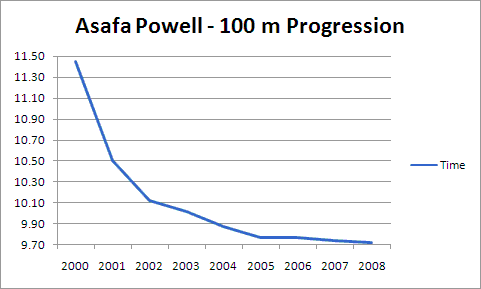
8. Legacy and impact
Asafa Powell's legacy in sprinting is multifaceted, encompassing his groundbreaking speed, his influence on Jamaican athletics, and his unique standing in the sport's history.
Powell's consistent ability to break the 10-second barrier, more times than any other athlete, cemented his reputation as a formidable and reliable sprinter. His two world records in the 100 metres further highlighted his exceptional talent and speed during his peak. Despite his individual world records and numerous victories on the Grand Prix circuit, Powell often faced challenges in major championship finals, which led to him being referred to as the "uncrowned king" or "Mr. Relay." This was due to a perceived mental hurdle that prevented him from consistently performing his best on the sport's biggest stages, such as the Olympic Games and World Championships. For instance, his best time in a major championship final up to 2008 was 9.94 seconds, despite having multiple runs under 9.8 seconds.
However, his contributions to relay events were undeniable. His phenomenal anchor legs in the 4 × 100 metres relay, particularly his record-breaking splits, earned him the nickname "Mr. Relay." He helped Jamaica secure gold medals and set national and championship records in this event, demonstrating his crucial role in team success.
Powell's impact on Jamaican athletics is significant. Ludlow Watts, Jamaica's track and field manager, credited Powell with initiating "this great change in our sprinting," acknowledging his pioneering role in establishing Jamaica as a global force in short-distance running. Along with Tyson Gay, Powell is recognized as one of the fastest men in history never to have won an individual Olympic medal.
Beyond the track, Powell also ventured into personal branding, launching an apparel and accessories line called "Sub 10 King," reflecting his signature achievement of consistently running under 10 seconds. His career, marked by both individual brilliance and the challenges of major championship pressure, leaves a complex but indelible mark on the history of sprinting.